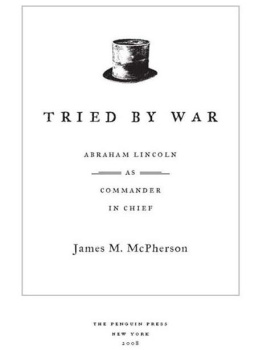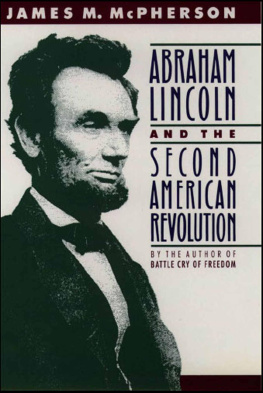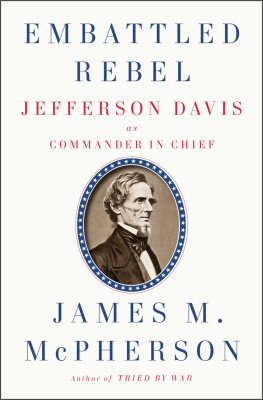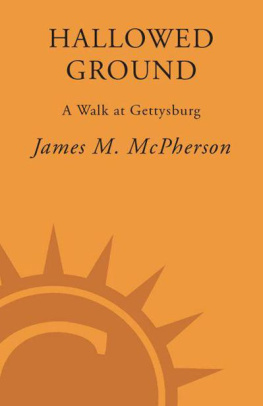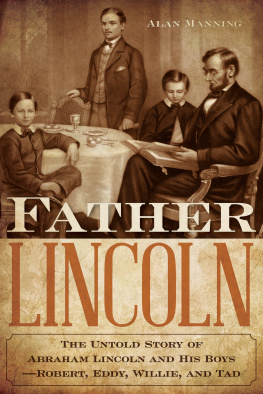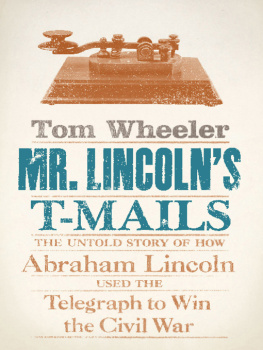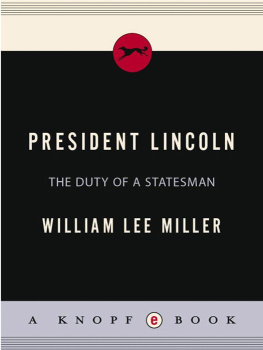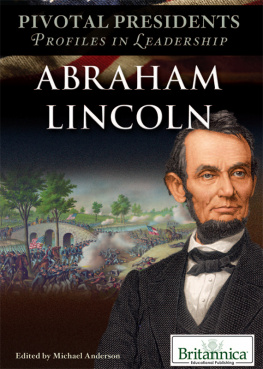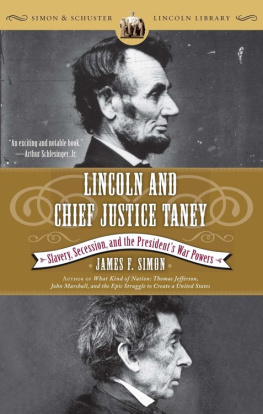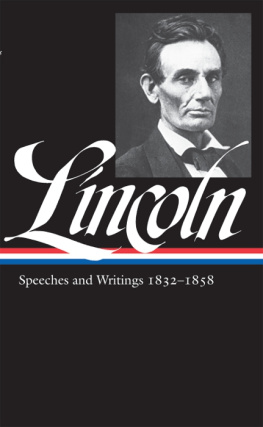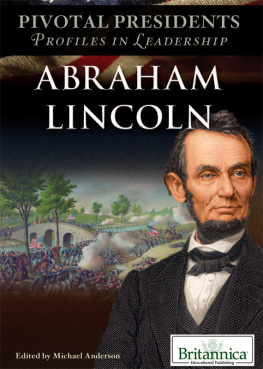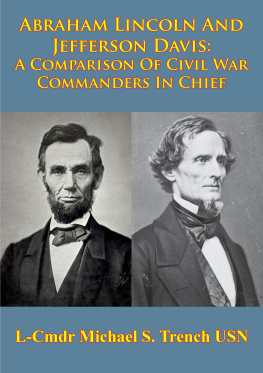ALSO BY JAMES M. MCPHERSON
TRIED BY WAR
ABRAHAM LINCOLN
AS
COMMANDER
IN CHIEF
James M. McPherson
THE PENGUIN PRESS
NEW YORK
2008
THE PENGUIN PRESS
Published by the Penguin Group
Penguin Group (USA) Inc., 375 Hudson Street, New York, New York 10014, U.S.A. Penguin Group (Canada), 90 Eglinton Avenue East, Suite 700, Toronto, Ontario, Canada M4P 2Y3 (a division of Pearson Penguin Canada Inc.) Penguin Books Ltd, 80 Strand, London WC2R 0RL, England Penguin Ireland, 25 St. Stephens Green, Dublin 2, Ireland (a division of Penguin Books Ltd) Penguin Books Australia Ltd, 250 Camberwell Road, Camberwell, Victoria 3124, Australia (a division of Pearson Australia Group Pty Ltd) Penguin Books India Pvt Ltd, 11 Community Centre, Panchsheel Park, New Delhi110 017, India Penguin Group (NZ), 67 Apollo Drive, Rosedale, North Shore 0632, New Zealand (a division of Pearson New Zealand Ltd) Penguin Books (South Africa) (Pty) Ltd, 24 Sturdee Avenue, Rosebank, Johannesburg 2196, South Africa
Penguin Books Ltd, Registered Offices:
80 Strand, London WC2R 0RL, England
First published in 2008 by The Penguin Press,
a member of Penguin Group (USA) Inc.
Copyright James M. McPherson, 2008
All rights reserved
Library of Congress Cataloging-in-Publication Data
McPherson, James M.
Tried by war: Abraham Lincoln as commander in chief / James M. McPherson.
p. cm.
Includes bibliographical references and index.
ISBN: 978-1-4406-5245-5
Lincoln, Abraham, 18091865Military leadership. 2. United StatesHistoryCivil War, 18611865. 3. United StatesPolitics and government18611865. 4. Executive powerUnited StatesHistory19th century. 5. PresidentsUnited StatesBiography.
I. Title.
E457.2.M478 2008
973.7092dc22
2008025229
Without limiting the rights under copyright reserved above, no part of this publication may be reproduced, stored in or introduced into a retrieval system, or transmitted, in any form or by any means (electronic, mechanical, photocopying, recording, or otherwise), without the prior written permission of both the copyright owner and the above publisher of this book.
The scanning, uploading, and distribution of this book via the Internet or via any other means without the permission of the publisher is illegal and punishable by law. Please purchase only authorized electronic editions and do not participate in or encourage electronic piracy of copyrightable materials. Your support of the authors rights is appreciated.
To Pat, for fifty years of
marriage and history
The insurgent leaderdoes not attempt to deceive us. He affords us no excuse to deceive ourselves. He can not voluntarily reaccept the Union; we can not voluntarily yield it. Between him and us the issue is distinct, simple, and inflexible. It is an issue which can only be tried by war and decided by victory.
Lincolns annual message to Congress, December 6, 1864
CONTENTS


PREFACE
A BRAHAM L INCOLN was the only president in American history whose entire administration was bounded by war. On the day he took office the first document placed on his desk was a letter from Maj. Robert Anderson at Fort Sumter, informing him that the garrison there must be withdrawn or resupplied at the risk of war. Lincoln chose to take that risk. Four years later he was assassinated, five days after Gen. Robert E. Lee surrendered at Appomattox but while several Confederate armies were still in the field.
During those four years military matters required more of Lincolns time and energy than anything else. He spent more time in the War Department telegraph office sending and receiving messages to and from his generals than anywhere else except the White House or his summer residence in the Soldiers Home at the northern edge of Washington. The president rarely left Washington except to visit the Army of the Potomac at the front, which he did eleven times for a total of forty-two days. Not only Lincolns success or failure as president but also the very survival of the United States depended on how he performed his duties as commander in chief.
In the vast literature on our sixteenth president, however, the amount of attention devoted to his role as commander in chief is disproportionately far smaller than the actual percentage of time he spent on that task. On the 175th anniversary of Lincolns birth in 1984, Gettysburg College hosted a conference on recent Lincoln scholarship. There were three sessions on psychobiography, two on the assassination, two on Lincolns image in photographs and popular prints, and one each on his economic ideas, humor, Indian policy, and slavery. But there were no sessions on Lincoln as commander in chiefa remarkable irony, given the site of the conference. Of the seventeen collected essays on Lincoln published in 1987 by the late Don E. Fehrenbacher, one of the foremost Lincoln scholars of his time, not one dealt with the president as a military leader. In 1994 the historian Merrill Peterson published a splendid book on Lincolns image in history and memory. There are chapters on Lincoln and the South, religion, politics, Reconstruction, civil rights, and several other themes, but no chapter on Lincoln and the army.1
Perhaps it is time to recognize the truth expressed by Lincoln himself in his second inaugural address, when the Civil War had been raging for almost four years: On the progress of our armsall else chiefly depends.2 All else included many of the questions and developments that historians consider important: the fate of slavery; the definition of freedom; the destruction of the Old Souths socioeconomic system and the triumph of entrepreneurial free-labor capitalism as the national norm; a new definition of American nationalism; the origins of a new system of race relations; the very survival of the United States in a manner that laid the foundations for the nations emergence as a world power.
It was the commander in chief who was held mainly responsible for the progress of our armsor the lack thereof. This book offers a narrative and analysis of howand how wellLincoln met this challenge, which was unquestionably the chief challenge of his life and of the life of the nation.
NOTE ON QUOTATIONS
Original spellings and punctuation have been preserved in quotations without inserting the intrusive [ sic ].
T RIED BY W AR
INTRODUCTION
O N J ULY 27, 1848, a tall, rawboned Whig congressman from Illinois rose in the House of Representatives to challenge the Mexican War policies of President James K. Polk. An opponent of what he considered an unjust war, Abraham Lincoln mocked his own meager record as a militia captain who saw no action in the Black Hawk War of 1832. By the way, Mr. Speaker, did you know I am a military hero? said Lincoln. Yes, sirI fought, bled, and came away after charges upon the wild onions and a good many struggles with the musketoes.1
Lincoln might not have indulged his famous sense of humor in this fashion if he had known that thirteen years later he would become commander in chief of the U.S. Army in a war that turned out to be forty-seven times more lethal for American soldiers than the Mexican War. On his way to Washington in February 1861 as president-elect of a broken nation, Lincoln spoke in a far more serious manner. He looked back on another war, which had given birth to the nation that now seemed in danger of perishing from the earth. In a speech to the New Jersey legislature in Trenton, Lincoln recalled the story of George Washington and his tiny army, which crossed the ice-choked Delaware River in a driving sleet storm on Christmas night in 1776 to attack the Hessian garrison in Trenton. There must have been something more than common that those men struggled for, said the president-elect. Something even more than National Independencesomething that held out a great promise to all the people of the world for all time to come. I am exceedingly anxious that the Union, the Constitution, and the liberties of the people shall be perpetuated in accordance with the original idea for which that struggle was made.2

